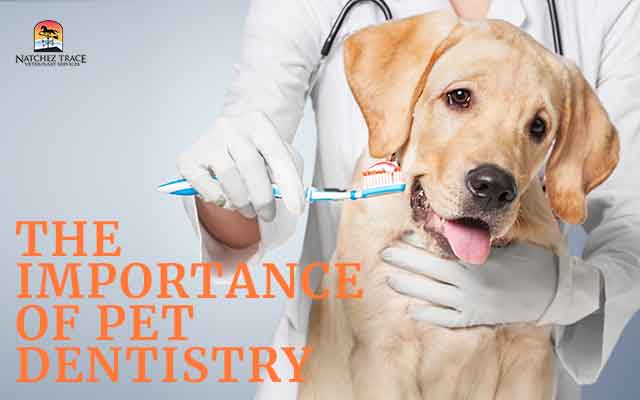In the pursuit of a vibrant and healthy life for your furry companions, understanding the significance of proper pet oral care and pet dentistry becomes paramount.
Amidst the love and treats you share with your pets, the essential nature of their dental health can sometimes be downplayed.
In this exploration, we’ll illuminate the profound impact of oral care on your pet’s overall health, discussing prevalent dental issues, effective preventive measures, and the crucial contributions of veterinary dentists.
Champion the cause of your furry friend’s dental wellness – an integral aspect of their happiness and longevity.
Watch this video of Dr. Smith concisely explaining the importance of professional dental care for pets:
The Significance of Pet Dentistry
Pet dentistry holds a pivotal role in ensuring the overall health and well-being of your furry companions. Beyond the surface-level concern of a bright smile, the significance of maintaining proper oral health in pets extends to various aspects of their lives.
- Prevention of Dental Issues: Proper pet dental care is fundamental in preventing common dental issues in pets such as periodontal disease, gingivitis, and tooth decay. By addressing these concerns proactively, pet owners can safeguard their companions from discomfort, pain, and potential complications.
- Impact on Overall Health: Oral health is intricately linked to the overall health of pets. Untreated pet dental problems can lead to systemic issues affecting vital organs like the heart, liver, and kidneys. Regular dental care contributes to a healthier pet, reducing the risk of secondary health issues.
- Enhanced Quality of Life: Pets with good oral health are more likely to lead a comfortable and happy life. A pain-free mouth allows them to eat, chew, and play without hindrance, promoting an active and joyful lifestyle.
 Longevity and Aging Gracefully: The longevity of pets is closely tied to their overall health, and dental care plays a crucial role in this equation. By addressing dental issues early and maintaining regular dental hygiene, pet owners contribute to their furry friends aging gracefully and enjoying a longer life.
Longevity and Aging Gracefully: The longevity of pets is closely tied to their overall health, and dental care plays a crucial role in this equation. By addressing dental issues early and maintaining regular dental hygiene, pet owners contribute to their furry friends aging gracefully and enjoying a longer life.- Preventing Bad Breath: While bad breath in pets is often dismissed as a common issue, it can be an indicator of underlying dental problems. Regular pet dental care helps combat bad breath, ensuring not only a pleasant interaction for pet owners but also addressing potential health issues.
In essence, pet dentistry is not merely about aesthetics; it is a cornerstone of responsible pet ownership. By recognizing and acting on the significance of dental care, pet owners actively contribute to the overall health, happiness, and longevity of their beloved companions.
Regular dental check-ups, preventive measures, and professional dental care for pets form a holistic approach to ensuring that pets maintain vibrant smiles and robust well-being throughout their lives.
Common Dental Problems in Pets
Just like their human counterparts, pets are susceptible to a range of dental issues that, if left unaddressed, can impact their overall health and well-being. Understanding these common dental problems is crucial for pet owners to provide timely care and ensure the longevity of their furry friends.
- Periodontal Disease: One of the most prevalent dental issues in pets, periodontal disease, affects the tissues surrounding the teeth. Plaque and tartar buildup leads to inflammation, causing red or bleeding gums, bad breath, and, in advanced stages, tooth loss. Regular dental care is essential to prevent and manage this progressive condition.
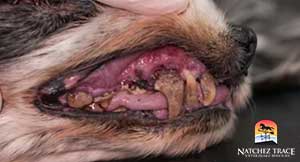 Gingivitis: Gingivitis, characterized by inflammation of the gums, is often a precursor to periodontal disease. It manifests as red, swollen gums and can cause discomfort for pets. Gingivitis is reversible with proper dental care, including regular brushing and professional cleanings.
Gingivitis: Gingivitis, characterized by inflammation of the gums, is often a precursor to periodontal disease. It manifests as red, swollen gums and can cause discomfort for pets. Gingivitis is reversible with proper dental care, including regular brushing and professional cleanings.- Tooth Decay: While less common in pets compared to humans, tooth decay can occur, especially in older animals. Decay is often linked to a diet high in sugar or poor dental hygiene. Regular dental check-ups and appropriate nutrition play a crucial role in preventing tooth decay.
- Broken or Fractured Teeth: Pets can experience broken or fractured teeth due to trauma or chewing on hard objects. Broken teeth can expose sensitive nerves and lead to pain and infection. Immediate veterinary attention is necessary to address fractured teeth and prevent further complications.
- Malocclusion: Malocclusion refers to misalignment or incorrect positioning of the teeth, impacting how the upper and lower teeth fit together. This condition can lead to dental problems, difficulty eating, and, in severe cases, jaw issues. Treatment may involve orthodontic intervention or extraction, depending on the severity.
- Oral Tumors: While less common, oral tumors can occur in pets and may go unnoticed without regular dental examinations without pet dental care. Early detection is crucial for effective treatment. Veterinary professionals can identify abnormalities during routine dental check-ups, emphasizing the importance of regular examinations.
Understanding these common dental problems empowers pet owners to take proactive measures in their pets’ oral care.
Regular dental check-ups, a balanced diet, and at-home dental hygiene practices, including tooth brushing and providing dental chews, play pivotal roles in preventing and addressing these issues, ensuring pets maintain a healthy and pain-free mouth throughout their lives.
Preventive Measures for Pet Dental Health
Taking proactive steps to maintain your pet’s dental health is key to preventing common dental issues and ensuring a happy, pain-free life. Incorporating preventive measures into your pet care routine can significantly contribute to their overall well-being.
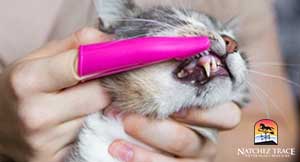 Regular Tooth Brushing: Introduce a routine of regular tooth brushing to remove plaque and prevent tartar buildup. Use a pet-friendly toothbrush and toothpaste to make the experience positive for your pet. Gradual acclimatization and positive reinforcement can help in making tooth brushing a stress-free activity.
Regular Tooth Brushing: Introduce a routine of regular tooth brushing to remove plaque and prevent tartar buildup. Use a pet-friendly toothbrush and toothpaste to make the experience positive for your pet. Gradual acclimatization and positive reinforcement can help in making tooth brushing a stress-free activity.- Dental Chews, Powders, and Toys: Provide dental chews and toys designed to promote oral health. Chew toys not only entertain your pet but also help reduce plaque and tartar by encouraging chewing and saliva production. Opt for products endorsed by veterinary professionals to ensure they are safe and effective. Kidney treats from Dr. Smith’s pet food company, PET | TAO, also support your pet’s teeth based on the Five Element Theory.
- Balanced and Dental-Friendly Diet: Choose a balanced diet that supports dental health. Specialized dental diets are available that aid in preventing plaque and tartar formation. Consult with your veterinarian to determine the most suitable diet for your pet’s oral health needs.
- Regular Veterinary Check-ups: Schedule regular dental check-ups. Professional dental examinations are crucial for identifying early signs of dental issues, ensuring prompt intervention, and addressing concerns before they escalate.
- Professional Dental Cleanings: Schedule yearly dental cleanings or ask Dr. Smith at your next appointment how often your pet needs a cleaning. These cleanings involve scaling and polishing to remove plaque and tartar that may have accumulated over time. The frequency of professional cleanings depends on your pet’s individual needs and oral health status.
- Oral Rinses and Gels: Explore oral rinses and gels specifically formulated for pets. These products can help maintain oral hygiene by reducing bacteria and promoting a healthy environment in your pet’s mouth. Consult with Dr. Smith to determine the most suitable options.
- Monitor for Signs of Dental Issues: Be vigilant for signs of dental problems such as bad breath, swollen gums, difficulty eating, or changes in behavior. Early detection allows for timely intervention and prevents the progression of dental issues.
By incorporating these preventive measures into your pet care routine, you actively contribute to their dental well-being. Consistent and positive pet dental care practices at home, coupled with regular veterinary oversight, ensure that your pet enjoys a lifetime of good oral health, contributing to their overall happiness and vitality.
Professional Dental Care for Pets
While at-home preventive measures are crucial, professional pet dental care plays a pivotal role in ensuring the comprehensive oral health of your pets. Our veterinary professionals are equipped with the expertise and tools needed to address specific dental issues and contribute to the overall well-being of your furry companions.
- Comprehensive Dental Examinations: Regular dental check-ups with Dr. Smith involve thorough examinations of your pet’s oral health. This includes inspecting the teeth, gums, and oral cavity for signs of dental problems such as periodontal disease, gingivitis, or abnormalities.
- Professional Dental Cleanings: Professional dental cleanings are essential to address plaque and tartar buildup that may not be fully preventable through at-home measures. These cleanings, performed under anesthesia, allow us to clean below the gumline and address issues that may not be visible during routine examinations.
- Diagnostic Imaging:
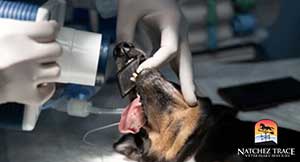 In some cases, dental issues may require diagnostic imaging such as dental X-rays to assess the health of tooth roots and surrounding structures. This advanced diagnostic tool aids veterinarians in identifying hidden problems and formulating appropriate treatment plans.
In some cases, dental issues may require diagnostic imaging such as dental X-rays to assess the health of tooth roots and surrounding structures. This advanced diagnostic tool aids veterinarians in identifying hidden problems and formulating appropriate treatment plans. - Treatment of Dental Issues: Should dental issues be identified during examinations or cleanings, we are equipped to provide necessary treatments. This may include tooth extractions, addressing infections, or recommending specific interventions to manage dental problems effectively.
- Anesthesia for Dental Procedures: Many dental procedures, especially cleanings and extractions, require anesthesia to ensure the safety and comfort of your pet. Dr. Smith carefully tailors anesthesia protocols to each pet, considering their health status and specific dental needs.
- Patient Education: Our vet techs play a crucial role in educating pet owners about proper dental care at home. They guide effective tooth-brushing techniques, suitable dental products, and dietary considerations to support optimal oral health.
- Individualized Dental Care Plans: Based on the specific needs and conditions of your pet, we can create individualized dental care plans. These plans may include recommendations for ongoing at-home care, follow-up appointments, and preventive measures tailored to your pet’s unique requirements.
By entrusting your pet’s dental care to us, you ensure a comprehensive and tailored approach to oral health. Professional dental care goes beyond routine check-ups, addressing issues at their root and promoting the longevity and well-being of your cherished furry companion. Regular consultations with Dr. Smith create a collaborative effort to safeguard your pet’s oral health throughout their life.
Conclusion: Advocating for Your Pet’s Dental Well-being
In the symphony of pet care, where every note contributes to the harmony of their well-being, pet dental health emerges as a key crescendo.
Professional dental care for pets, complemented by diligent at-home preventive measures, forms the cornerstone of ensuring your furry friend’s oral health is in tune with their overall vitality.
As a responsible pet owner, your commitment to your pets’ dental well-being goes beyond aesthetics; it reflects a dedication to their comfort, happiness, and longevity.
Regular veterinary check-ups, professional cleanings, and individualized care plans tailor the approach to the unique needs of each pet.
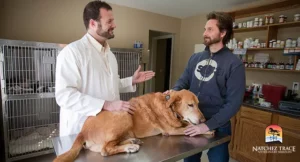 Through our collaborative efforts, you can advocate for a future where your pets enjoy vibrant smiles, pain-free mouths, and the joy that comes with good oral health.
Through our collaborative efforts, you can advocate for a future where your pets enjoy vibrant smiles, pain-free mouths, and the joy that comes with good oral health.
As we navigate the path of pet ownership, let us continue to champion the cause of our furry companions’ dental well-being – a melody that resonates with health, happiness, and the enduring bond we share with our beloved pets.
Enroll your pet into a healthy program for regular pet dental care by making your appointment now.
People Also Ask:
- How often should I brush my pet’s teeth, and what products should I use?
- Aim to brush your pet’s teeth at least 2-3 times a week using any pet-friendly toothbrush and toothpaste. You can also consult with Dr. Smith to choose suitable dental products based on your pet’s size, breed, and individual oral health needs.
- Is anesthesia necessary for professional dental cleanings, and is it safe for my pet?
- Anesthesia is commonly used for professional dental cleanings to ensure the safety and comfort of your pet during the procedure. We tailor our anesthesia protocols to each pet’s health status, minimizing risks and providing a controlled environment for effective dental care.
- What signs indicate that my pet may have dental issues, and when should I seek professional help?
- Signs of dental problems in pets include bad breath, swollen gums, difficulty eating, and changes in behavior. If you notice any of these signs or suspect dental issues, it’s advisable to seek professional help promptly. Regular veterinary check-ups, ideally every 6-12 months, help in early detection and prevention of dental problems.

